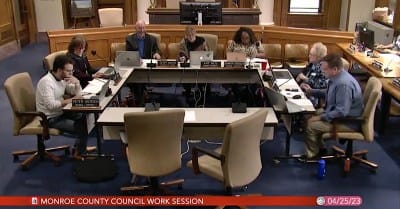Formation of criminal justice fiscal advisory committee mulled by Monroe County council

As soon as two weeks from now, on May 9, the Monroe County council could be taking a vote on the formation of a new criminal justice fiscal advisory committee.

The committee’s exact name, mission, membership, and scope have not been finalized.
But at a Tuesday work session, county council president Kate Wiltz announced the intent to form the committee, saying that she wants it to be ”transparent and inclusive in its activities.”
The creation of the new county council committee comes after county commissioners last week suspended meetings of the full community justice response committee (CJRC).
The county commissioners had established the CJRC—with evolving membership, including some county councilors, judges, the sheriff, the public defender and the county prosecutor—to provide advice how to respond to the work of two consultants. The consultants delivered their studies of Monroe County’s criminal justice system in June 2021.
The word “fiscal” in the name of the new committee to be formed by the county council reflects the fact that the county council is the county’s fiscal body.
Any funding for a new jail facility would have to be approved by the seven-member county council, no matter what decisions are made by the three county commissioners about the location and size of a new jail facility.
At Tuesday’s county council meeting, Wiltz said that councilor Peter Iversen was drafting the wording of a resolution to establish the committee. Wiltz, Iversen, and Jennifer Crossley are the county council’s representatives to the now-suspended CJRC.
Some behind-the-scenes efforts to keep the May 1 meeting of the CJRC on the calendar—despite the decision by commissioners to suspend the committee’s work—don’t look like they have met with success.
A group visit by county and city officials to the site of some county-owned land, south of Catalent, known as the Thomson PUD, was scheduled for Thursday (April 20) last week, the day after county commissioners suspended the CJRC’s work. The land could eventually be considered as the site of a new jail.
In an email message sent to the press on April 20, Iversen wrote that he thought a report about the Thomson site visit would be a good topic for the May 1 CJRC meeting agenda.
Reached by the B Square, Iversen said he intended to convey that same sentiment to county commissioners.
In an email message sent on Monday this week (April 24), deputy prosecutor and CJRC member April Wilson asked for time on the May 1 agenda for the prosecutor’s office and the public defender’s office to make a presentation.
The reply to Wilson the same day from Penny Githens, who’s president of the county board of commissioners, suggested that Wilson convey the presentation to the CJRC either in an email or at a meeting of the CJRC when it starts meeting again.
As for the May 1 meeting that had been on the calendar, Githens wrote: “As you know, the CJRC meeting originally scheduled for May 1, 2023, has been canceled.”
The exchange between Wilson and Githens also highlighted some friction over the creation of subgroups of the CJRC, which commissioners would like to see meet and prepare to report to the full CJRC when the full committee’s meeting resume.
Wilson wrote: “As the Prosecutor’s Office is a separate branch of government, you will need our consent to be placed on a subcommittee. At this time, we do not grant consent to be placed on the Court Processing Subcommittee.”
The two subgroups of the CJRC that the county commissioners would like to move the CJRC’s work forward were described in an email from Githens to the CJRC members on April 19. Githens wrote: “We propose forming two study groups: a Facility group and a Court Processing group. We will schedule the next CJRC meeting when it is time to hear from the Court group—Board of Judges, Prosecutor, Public Defender, etc.”
Githens wrote that commissioners hope to get a report from the Court Processing group in “one to two months,” with recommendations on the number of courtrooms that should be included in the new jail facility.
Githens also wrote that “it may not be possible initially—due to funding—to co-locate the courts, prosecutor, public defender, etc., …”
Details on how much funding might be available is something that the new committee, to be formed by the county council, could start to scrutinize.
If the creation of a new criminal justice fiscal advisory committee appears on the May 9 agenda, it will be posted on the county council’s web page.




Comments ()